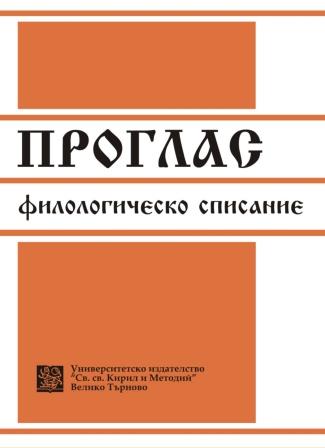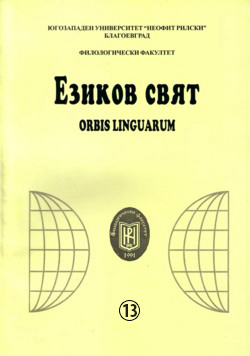
We kindly inform you that, as long as the subject affiliation of our 300.000+ articles is in progress, you might get unsufficient or no results on your third level or second level search. In this case, please broaden your search criteria.

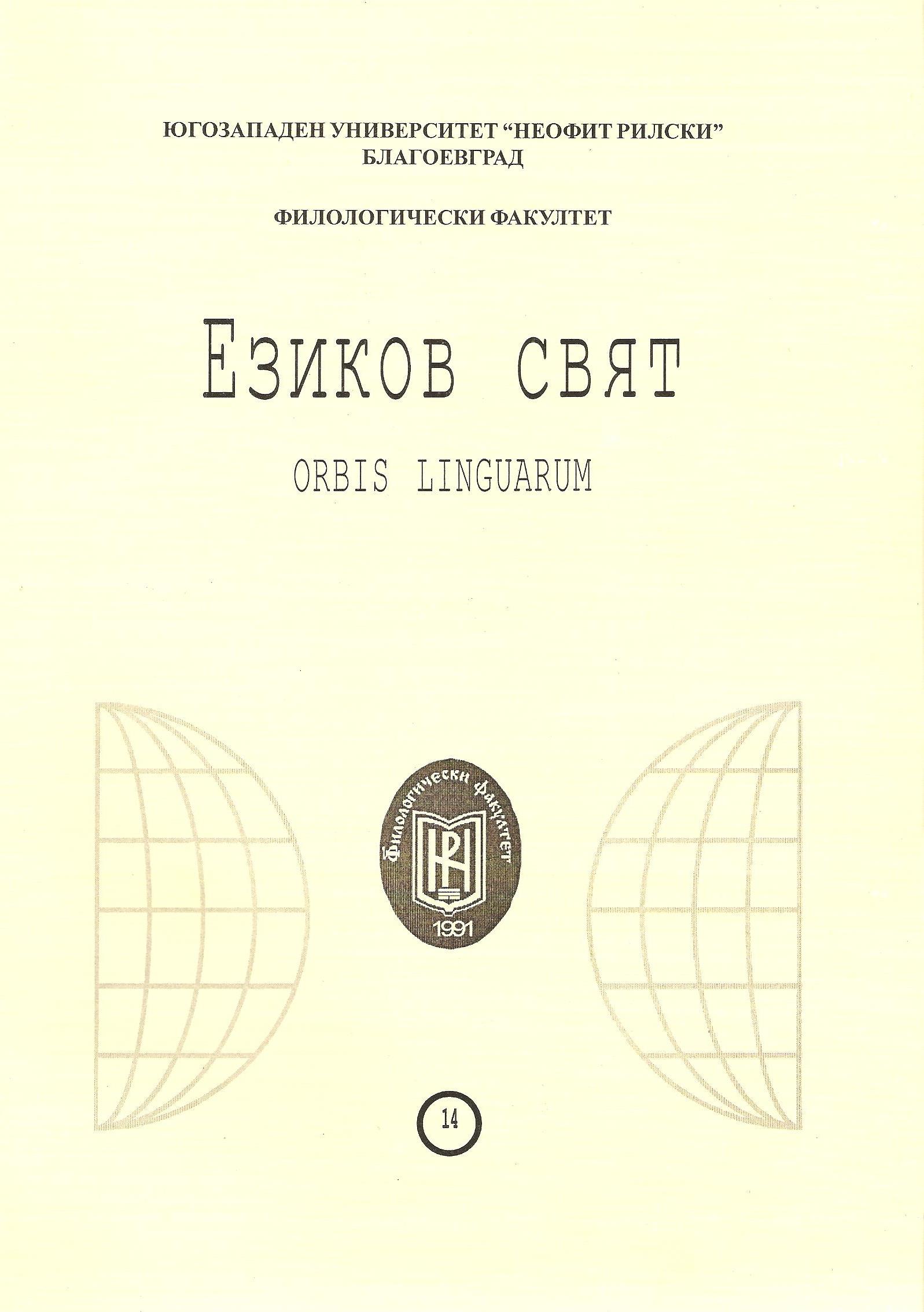
The article examines two patericon manuscripts texts from the library of Zograf monastery – № 406 and № 407. They are the work of the scholar Irinarh worked in the late nineteenth to early twentieth century. The manuscripts contain texts copied from two other manuscripts from Zograf and scholar notes, which are published here. Attached is the text of manuscript № 406, which tells about the famous Iviron icon „Holy Mother Panagia Portaritsa“.
More...
The article analyzes the rare Old Bulgarian word сътѫгъ as a translation of Greek σύνδεσμος (Hab. 2:11, variant reading). As far as the Hebrew original contains a hapax with undefined meaning, Old Bulgarian translation is viewed as dependent on Greek patristic sources and not LXX original. The reasons for the rarity of стѫгъ are questioned.
More...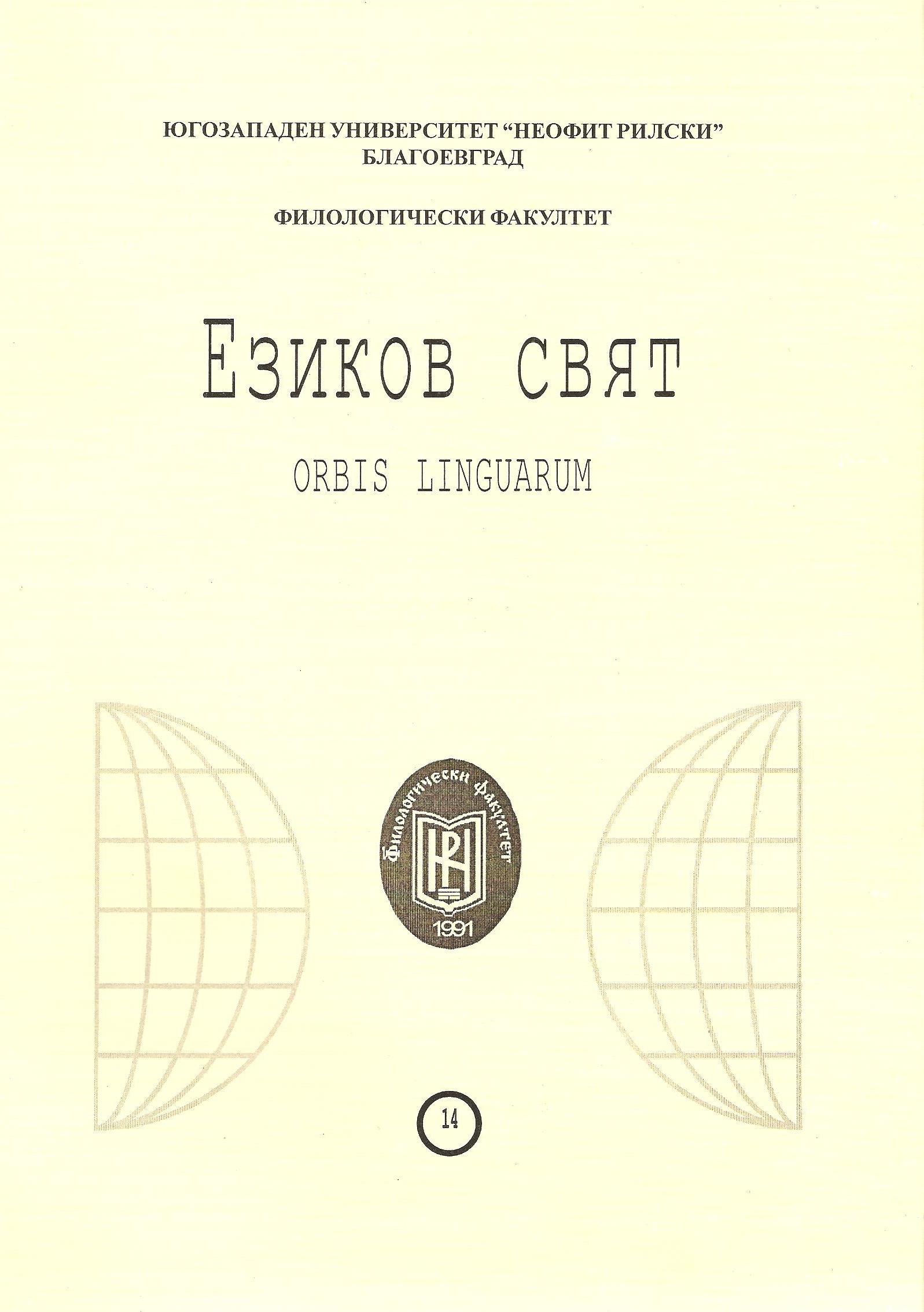
The text is following the pros and cons in the printed media of the Bulgarian national revival regarding the appearance of the theatre among Bulgarians. Opponents and supporters give respectively expression of fears or ambitions of the society towards European models of culture. The opposition to the theatre in fact is a nostalgia for the changing patriarch models of the community.
More...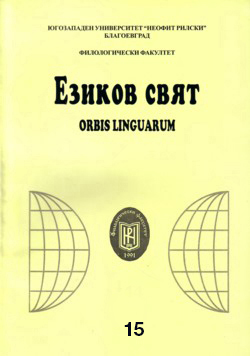
The main aim of the research is to reveal some common evidence about one lost copy of the “Slavo-Bulgarian History”, a historiography written by Paisiy of Hilandar, the Patriarch of the Bulgarian Revival period. The text also presents a version concerning Paisiy’s grave and some genealogical features concerning Apostle of Freedom Vasil Levski.
More...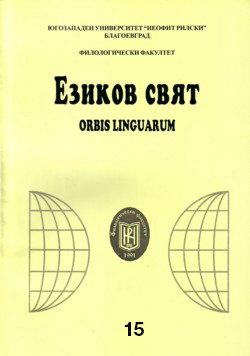
Until now, only three Bulgarian books published in the 17th century have been known, and the three of them were published by educated Bulgarians with the financial support from the Catholic Church. I managed to find another book written by a Bulgarian and published in 1679. This is a short philosophical and theological work (thesis) by Marcus of Chiprovets, written in Latin „in the spirit of Johannes Duns Scottus“ philosophy and printed in Prague. The author is said to have received his schooling from the school at Chiprovets (modern northwestern Bulgaria).
More...
This article discusses an almost unexplored source for the history of Bulgarian culture and language: a corpus of handwritten documents from the end of the 19th century, housed in the Scientific Archives of the Bulgarian Academy of Sciences. The documents provide information on the domestic production of clothing, fabrics and decoration, underwear and outerwear, accessories and jewelry, the cost of clothing and the time needed to produce it, opinions on the quality of home-made clothing and the purchased one. In this paper examples from the descriptions of clothing in Samokov and in Nikopol regions are analyzed in order to show the main points of the description of the clothes of different social, age, religious and local groups in Bulgaria after the liberation from the Ottoman rule.
More...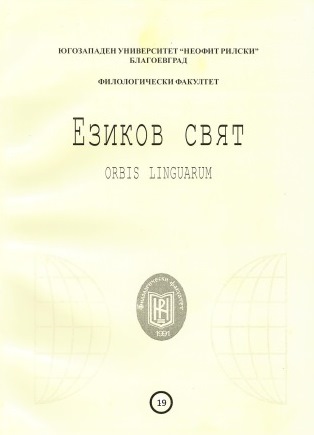
The article reveals the issue of the contribution of one of the most authoritative families in Bulgaria – the Shishmanovs in the formation and development of the Bulgarian theatre. In the second half of the 19th century a teacher and public figure Dimitar E. Shishmanov opened the first private trade school, reading room and founded an amateur theatre in Svishtov. He translated dramas of famous European playwrights and created his own plays for the theatre. His son Ivan Shishmanov continued his father’s work in the cultural and educational development of the country. Having received an excellent education abroad, he returned to Bulgaria to raise the level of the education, literature and culture. From 1889 until 1894 Ivan Shishmanov worked as the Head of the Department at the Bulgarian Ministry of Education. During that time, he helped young writers, artists, actors, actresses and musicians to go abroad to study or for an internship. As Bulgarian Minister of Education (1903-1907) Ivan Shishmanov opened the Academy of Music and the National Theatre. His wife Lidia Shishmanova was fond of dramatic art. She collaborated with a number of periodicals, where she regularly published reviews of theatrical performances. The son of Ivan and Lidia – Dimitar Shishmanov continued his parents’ activities. He was a writer, publicist, translator from Ukrainian, German, French, Greek, and a playwright, whose plays were staged at the National Theatre. The ideas of three generations of Shishmanovs stimulated the development of the Bulgarian theatre and their contribution to the cultural treasury deserves high appreciation.
More...
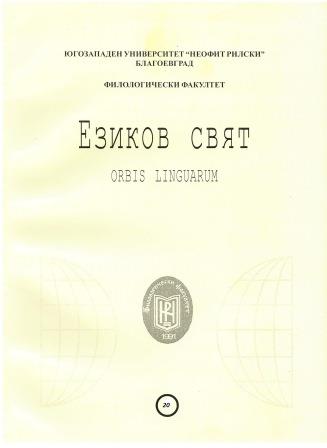
The deals with the novel “Zhari in Africa” by Emil Koralov, published in 1942. The author of the paper focuses on the fantastic in the novel – the mechanisms that realize it, the relations between fantasy and realism. She pays attention to the adventure, the education, the cult of the science and the Utopia in view of the fact that this novel was created for children. Fantasy is a relatively young genre in contemporary Bulgarian literature. It was created under the influence of the translated literature and its beginning can be traced in diabolism. Between World War I and World War II far more fantastic books for children were published than for the adults. Such books were written by Emil Koralov, Elin Pelin, Nikolay Fol, etc. The accent is on adventure, travels in unknown lands and seas, and new technologies. The authors use some motifs from folklore and mythology. Emil Koralov was one of the first authors who wrote science fiction in the field of children’s literature and he was actually the most prolific writer between the World War I and the World War II. He wrote more than twenty novels for two decades. These novels were published in sequential instalments on the pages of the literary newspaper for children and teenagers “The Jolly Company”. Then these novels were exceptionally popular.
More...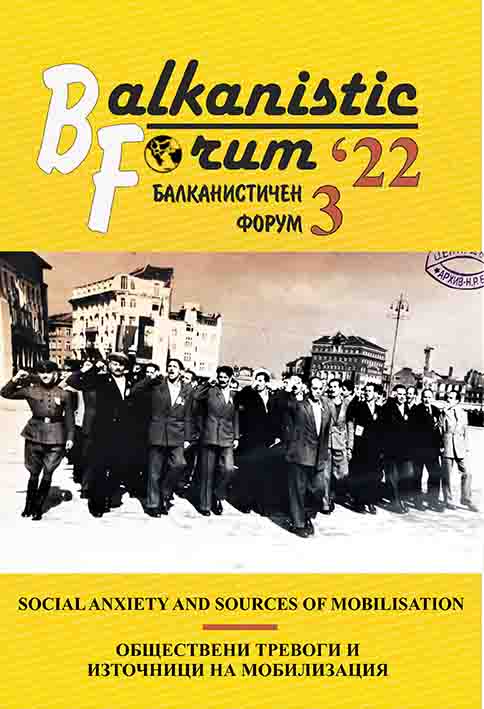
This article is a review of the study entitled Взривена литература. Военни прози, партизански разкази, партийни мемоари [Explosive Literature: Military Predictions, Partisan Narratives, Party Memoirs], authored by Maya Angelova.
More...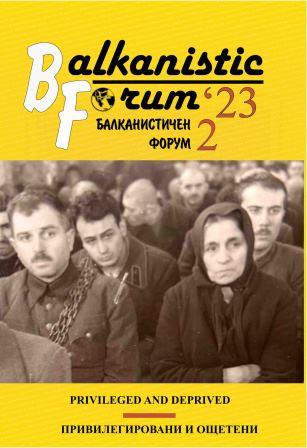
The paper examines the problems faced by evangelical ministers condemned in the so-called Pastoral Trials (1948–1985) and their families. At the same time, the Bulgarian State Security managed to launch its own cadres to take the places of uncomfortable ones on the pulpits and push state policy following the KGB models. And they suc-ceeded in converting even some of the pastors who have been caught up in the judicial processes and declared unjustly. Attention is paid to the instigated opposition against highly educated and erudite clergymen enjoying authority in society, by officials obe-dient to the new authority, ready to sell their faith for some silver coin.
More...
One of the most characteristic phenomena of the Transition in Bulgaria in the 1990s were the socalled Wrestlers’ brigades. Their emergence and rise left a lasting imprint on the social fabric and provided the initial impetus for the formation of the so-called ‘Wrestlers/ Mutri’ subculture. In a situation of rapidly changing public, economic and social environments in Bulgaria after the fall of the totalitarian regime in 1989, the Wrestlers’ brigades gave young men with modest family backgrounds the opportunity to become part of a set enjoying a progressively privileged economic and social circumstance. In the aftermath of the state's abdication of its regulatory and adjudicative functions, these groups and their individual members gained access to various power levers and transformed from privileged to privileging — granting privileges — both to in-group members (family, friends, etc.) and outsiders such as politicians, business people, artists, etc. This process of transformation from disadvantaged to privileged in this context has not yet been fully explored. The available documentary and archival information is currently limited and difficult to access. Fiction as a parallel source allows us to consider these processes from a different angle. The purpose of the proposed paper is to analyse the novels of Georgi Stoev – admittedly a former member of a Wrestler’s group, as a source of information about the process of transformation from disadvantage to privilege and of specific subcultural traits. By comparing the information in the eight books in the ‘Witnesses of the Times’ and ‘BG Godfather’ series with publicly available documents, studies and publications, a deeper understanding is obtained of the values and dynamics of the Wrestlers/ Mutri subculture in Bulgaria at the end of the 20th and the beginning of the 21st century.
More...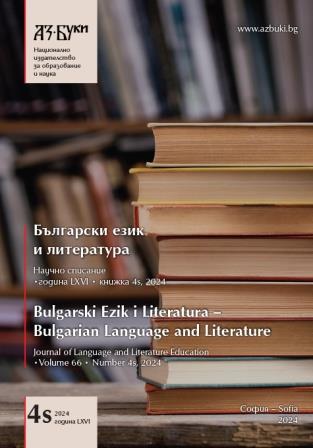
The text discusses the challenges and importance of the presence of Bulgarian literature in the foreign academic context. Existing resources and academic practices are reviewed and reassessed. The emphasis is on the presentation of Bulgarian literature in the framework of Bulgarian language, literature and culture lectureships, where literature gains importance, as it is a resource with broad functions. Finally, a methodological framework for working on a specific text (memoirs) is proposed, connecting Bulgaria and Italy, in particular - Bulgaria and Naples.
More...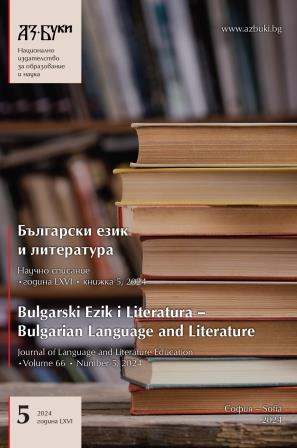
This paper traces the temporal markers (year, day, hour, minute, moment) in Bulgarian Revival-period poetry. In addition, it zooms into the lyrical interpretations of time as the legacy of ancient attitudes and images (in terms of parallels with Greco-Roman mythology and with the Bible). Personal perceptions of time are linked to the specificity of historical events and their meaning; time is illustrated with the distinct ages of human beings and with the different seasons; it is also seen as a marker of the dynamics of the present.
More...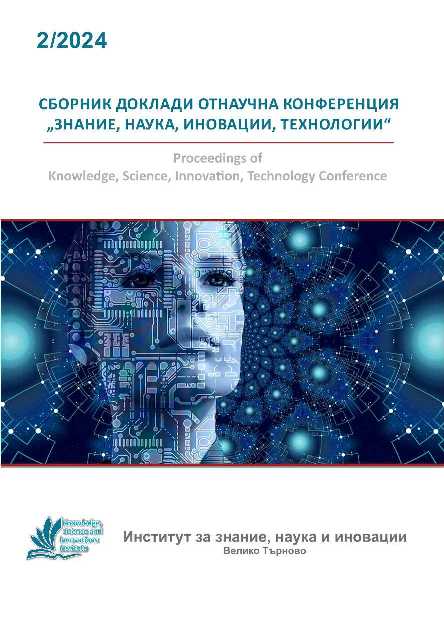
The proposed article examines the use of the forms of dialogue, monologue, and soliloquy in literature. It does it on examples from Stanislav Stratiev's work, emphasizing texts from his latest book "Babylonian Chronicle." We consider it a culmination in the use of the soliloquy. We continue its examination in its modern updates, which we find in the texts published by Kitodar Todorov with the book "Friday Five Sharp".
More...
The article examines the spoken Bulgarian and Ukrainian translations of the Holy Scriptures in the 19th century. It is established that, compared to the Ukrainian ones, the Bulgarian language translations appeared much earlier, had a much better distribution and had a greater influence on the consolidation of the new literary language. The reason for this is the different political and cultural conditions in which these two peoples are developing. The bans on Ukrainian printed speech, which were in force in the Russian Empire, did not allow until the beginning of the 20th century to print a Ukrainian translation of the Holy Scriptures, as well as to distribute the translations made in Austria-Hungary. Therefore, in general, in the 19th century, translations of the Holy Scriptures did not influence the formation of the new Ukrainian literary language in the way that could be expected from such texts. In the Ottoman Empire, the work on translations of the Holy Scriptures into modern Bulgarian was led and financed by the British and Foreign Bible Society. This contributed to these translations being in closer contact with the emerging New Bulgarian literary language and to influencing its consolidation.
More...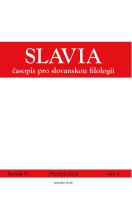
The study deals with the theme of the Shoah in Bulgarian postwar literature, which includes both works of fiction (authors like Viktor Baruh, Salis Tadzher, Simcho Isakov etc.) published in the People’s Republic of Bulgaria (1946–1990), and literature of Bulgarian Jews in Israel (Albert Beni, Albert Mihael, Albert Varsano etc.). The article is an attempt to interpret the selected works (novels, novellas, short stories, poetry and memoirs) with regard to various discursive strategies that have changed and adapted to different socio-political contexts in both countries. The themes of the Shoah and the anti-Jewish policy of tsarist Bulgaria could take on diverse ideological functions depending on the context. Literature thus became an important component of various memory constructs in postwar Bulgaria and as well as in Israel.
More...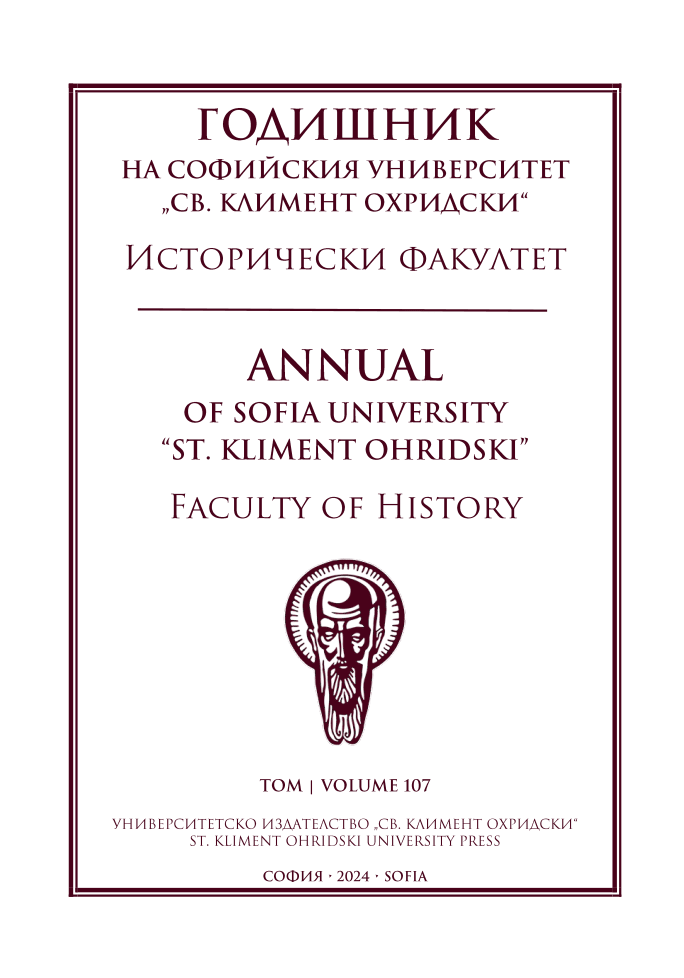
The international conference on Bulgarian studies, which was organized by the Faculty of History, the Faculty of Slavonic Philology and the Department of Language Teaching of Sofia University “St. Kliment Ohridski”, aimed to bring together scholars from Bulgaria and abroad to exchange knowledge and research in the field of Bulgarian studies, history, anthropology, contemporary Bulgarian literature, language and translation. The conference provided a platform for novel research and the promotion of Bulgarian studies, with over forty presentations and participants hailing from over seven countries.
More...